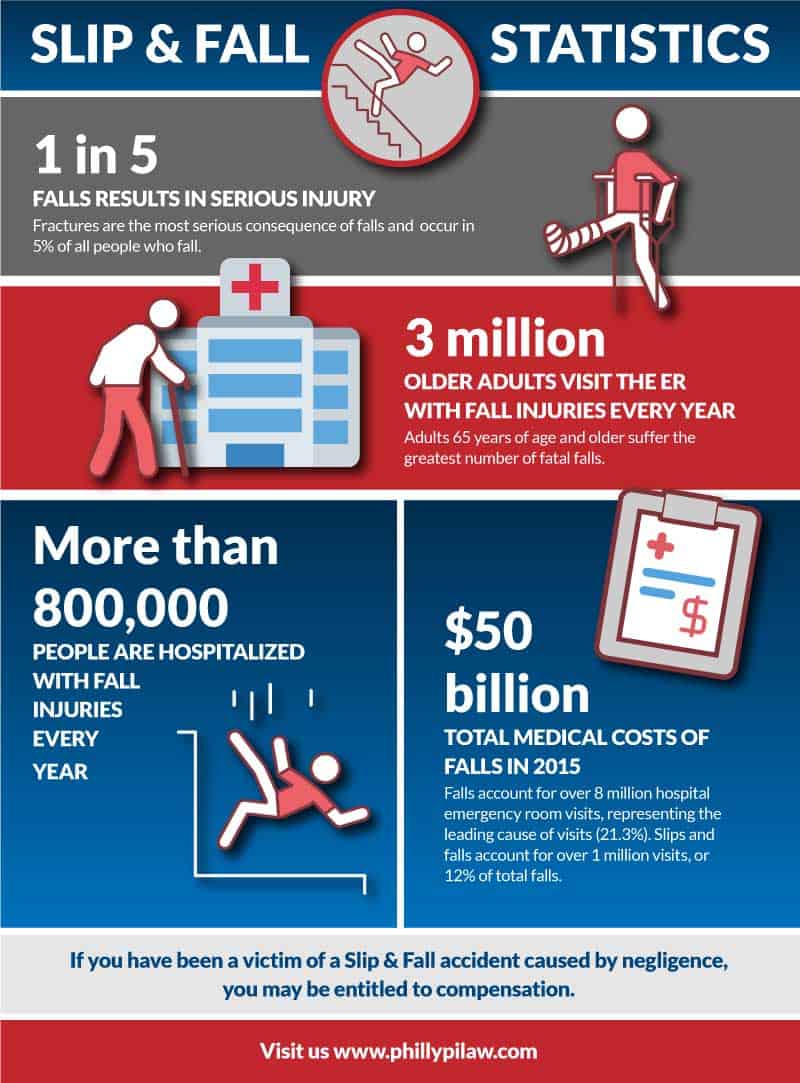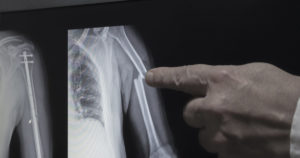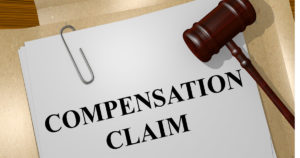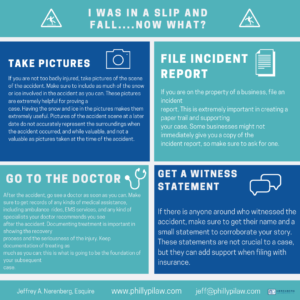Philadelphia Slip and Fall Accident Lawyer
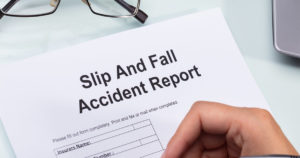
Victims of a recent accident should reach out to a Philadelphia Slip and Fall Attorney and review all the compensation options that are available. Victims cannot recover fully or enjoy the quality of life they deserve if they do not take swift action after suffering because of a property owner’s negligence. In every case, it is important that a lawyer complete a full investigation.
Are Slip and Fall Accidents Common?
Slip and fall accidents may result in serious injuries such as broken bones, back injuries, head trauma, or wrongful death. These types of injuries can make it difficult for people to be mobile, perform their activities of daily living, or even live on their own. According to the Centers for Disease Control and Prevention (CDC), more than 800,000 people are hospitalized with fall injuries every year.
The National Floor Safety Institute notes several statistics from government agencies concerning slip and fall accidents. Slip and fall accidents account for around one million hospital visits every year, representing over 10 percent of all visits. The Consumer Product Safety Commission notes that flooring alone accounts for around two million injuries every year, and half of all accidental deaths in homes are caused by flooring.
Older adults, those age 65 years and older, suffer the greatest number of fatal falls. In addition, the medical costs of falls reach well into the billions of dollars. Falls are the second greatest cause of injury deaths among seniors and falls cause nearly 90 percent of all broken bones among seniors age 65 or older. Sadly, 60 percent of nursing home residents will fall every year.
The American Trucking Association says that slip and fall accidents cause the largest number of compensable injuries, even more than vehicular accidents. Moreover, approximately 85 percent of Workers’ Compensation claims are caused by a slip, trip, or fall. Although adults often believe that they are not clumsy or have good balance, there is no way to know when they could fall and suffer a serious injury.
Where can Slip and Fall Accidents Occur?
Slip and fall accidents can occur anywhere at any time, but they most often occur on slippery or uneven ground. Unfavorable weather conditions such as wind, rain, snow, and ice increase the likelihood that someone will slip and fall. Wet floors left behind after cleaning can cause injuries, decks might collapse, handrails could fail, or damaged stairs might cause someone to tumble to the bottom.
Sidewalks and parking lots are filled with people every day, and warehouses or factories have large, open floors that become slick during the day. Fast food restaurants, office buildings, and government buildings might have slick floors, or an elevator may not stop flush with the floor, causing boarding or departing passengers to trip.
Spills and slick floors in retail stores are equally dangerous, or the flooring in the hall of a hotel or apartment building may not be in good condition. If the facility has a swimming pool, slip and fall incidents might occur because of damaged concrete around the pool and/or inadequate warnings. Damaged carpeting in an office can cause just as many injuries, or contracted office workers might slip and fall when they stumble over the leg of a chair in a tight space.
Some people walk into unlit or dimly lit areas where they have so little visibility that they slip and fall. Amusement parks may have slippery ground or awkward queues that make it difficult for victims to avoid a fall. Potholes and ditches are just as dangerous for runners or anyone simply looking to cross the street.
Sports stadiums and large theaters are equally troublesome because guests must cover quite a lot of ground to get where they want to go. Even a tiny bit of damaged flooring or a broken handrail can cause serious injuries. Although most people go out to have a good time and do not want these accidents to get in the way, they should report these accidents, take pictures of the scene, and seek medical attention as soon as possible.
Nursing homes can be a site for injuries as visitors and residents slip and fall. Although the residents of a nursing home may be more susceptible to slipping and falling, any faults in the facility could cause a grandchild, security guard, or other visitor to slip and fall.
Private homeowners can face lawsuits for slip and fall accidents. Homeowners must keep their homes in good condition to prevent such accusations. Local ordinances require homeowners to clear their sidewalks and driveways of ice and snow. If the stairs or deck on the property are damaged, the homeowner can be sued to recover damages after an accident. Even someone who slips inside the home during a party could sue if it is clear the house is not kept in good condition. For example, a raised piece of hardwood flooring might not trip family members who know to avoid it, but guests who do not know better could be badly injured.
What is Premises Liability?
Premises liability law points directly at the owner or manager of a property who must keep that facility in good condition. Premises liability claims have a few elements that victims must understand if they wish to recover compensation.
First, the property owner has a duty of care to protect those on the property, and it must be absolutely clear that the owner or manager violated that duty of care. This is generally proved by demonstrating the negligence or inaction of the owner/manager.
Victims must receive medical care just after the accident to prove that they were hurt on the day of the accident. For example, the victim might have slipped and sprained their ankle at a football game. They were drinking during the game and simply wrote off the injury. A few days later, they seek medical attention because they simply cannot walk anymore. When they file suit, the owner of the stadium will claim that the victim was not even injured on the premises because they did not report the accident, they have no photographic evidence, and they did not seek medical care until days later.
Finally, the victim must show that the negligence or inaction of the property owner directly caused their injuries. Although it is often quite clear that victims were injured by long-standing inaction, such as never repairing damaged stairs, other injuries are simple accidents that cannot be avoided. For example, someone slips and falls on a soda that a child just spilled on the floor of a retail store. The retail store and its management team simply cannot clean up accidents that quickly, and the claim may not move forward.
Who Could be Liable for My Accident?
In some cases, these facilities are owned by someone else and rented by a tenant. If the tenant asks the owner to repair damaged flooring and someone slips and falls on that flooring, the owner of the facility is liable.
Apartment complexes are often owned by large corporations, and that corporation is liable for accidents when it fails to maintain the property. If the corporation employs a third-party management firm to handle the property, the management company can face a lawsuit for failing to maintain the property.
In large industrial parks, offices, or retail stores, tenants should keep up with their units, but the rest of the property is the responsibility of the property owner. Some examples of poor maintenance include negligent security, ice or snow buildup, facility malfunctions, unsafe storage of products or merchandise, uneven sidewalks, and other issues.
Reviewing the circumstances of the accident with a lawyer gives victims the opportunity to better understand who is liable and how the accident occurred. Although victims may share their account of the accident, take pictures, and speak to eyewitnesses, the underlying causes of the accident may be difficult to uncover at first glance.
Maintenance companies, skilled laborers, or product manufacturers may be liable for these accidents if it is clear that they created the situation that caused the accident. For example, a plumber claimed that they repaired a broken pipe on the fountain at the center of the property, but it continued to leak. When a visitor slips and falls due to the laborer’s negligence, the laborer is liable for the accident because the property owner or manager can prove that it ordered repairs and believed they were completed as required.
What are Common Slip and Fall Injuries?
Injuries occurring after slip and fall accidents are often difficult to detect because many people tend to walk it off and move on with their lives. In some cases, victims write off these injuries as the aches and pains they would expect without understanding that their injuries go much deeper. Common slip and fall injuries include the following:
Broken bones. The victim of a fall could break bones in their legs, arms, and hands. Someone who impacts the ground without bracing their fall might suffer broken ribs or even facial fractures. Severe breaks are often obvious, but broken fingers, toes, or hairline fractures may be hidden behind nagging pain. The victim may believe the pain will go away in a few short days, but that may not be the case. Victims should seek medical attention to ensure that broken bones are set properly.
Soft tissue injuries. Soft tissue injuries are even more hidden than hairline fractures. The victim may not realize that they are suffering from tendon or ligament damage. They may believe they are getting older and they just do not recover as fast as they once did. These victims require medical attention so that they can recover quickly and retain their ability to work. Someone who has minor injuries and never receives treatment might find it difficult to walk in the office, type, or handle larger tasks in a warehouse or industrial job.
Sprains and strains. Sprains and strains might hobble the victim, but they may assume that they will get better in a short time. Because a strain or sprain is a slight muscle tear, the muscle will continue to tear without treatment. Victims ignoring these injuries could cause such severe damage that they require surgery when their initial treatment would have been much simpler.
Knee injuries. Someone who falls might land on their knees first, breaking their kneecaps or causing ligament damage. Even a bruised kneecap is extremely painful and may require several days of rest.
Cuts and scrapes. Cuts and scrapes are common because the victim is trying to brace their fall and could injure their hands, arms, and/or legs in the process. Victims should not walk away from minor falls without first seeking medical care and reaching out to a lawyer for a consultation.
Broken hips. Although teens and adults under the age of 50 may not suffer from broken hips, the pelvis becomes more vulnerable as victims get older.
Shoulder or neck injuries. Separated shoulders, whiplash, severe neck pain, or even broken vertebrae in the neck can cause a months-long recovery. Victims should allow a doctor to use imaging to diagnose these conditions. This type of injury can also induce headaches, nausea, or dizziness.
Spinal cord injuries. In a severe fall, the victim might damage their spine or spinal cord. If the victim cannot move after an accident, those at the scene should not try to stabilize them before EMTs arrive. Even if the victim can walk after the accident, they may suffer from impaired movement and chronic pain. In the worst cases, victims may be paralyzed or partially paralyzed.
Traumatic brain injuries. Traumatic brain injuries can cause memory problems, a drastic change in mood, or confusion. Victims may not realize their injury is that severe until they simply cannot work or cannot even hold a conversation. Skull fractures, swelling, or bleeding on the brain is even more severe and should be treated by a doctor as soon as possible.
What Types of Compensation are Available?
Personal injury lawsuits help victims recover and move on with their lives as normally as possible. Although some victims may suffer from disability or severe injuries that require a lifetime of care, others simply need to recover their expenses so that they can move forward without the lingering specter of medical debt. Most slip and fall lawsuits petition for damages, including the following:
Medical damages. These damages include all the money spent or owed by the victim as a result of their medical care. Medical care often starts at the time of the accident, and it can continue for a long period. If the medical bills will continue even after the accident, the victim needs money to pay for those expenses as they arise. If necessary, a medical expert can testify to the vast extent of the victim’s injuries, explaining why certain procedures are required, should be paid for, but have not yet occurred.
Lost earnings. Damages for lost earnings also begin at the time of the accident. Victims cannot work if they are injured and recovering in the hospital or at home. Although the victim may have access to sick time that could pay for a few days of recovery, major accidents might require months or even years to reach a full recovery. If the victim loses their job, they are losing future earnings that they were expecting had the accident never happened.
Lost earning potential. This will begin when it is clear that the victim cannot make the money that their lifestyle requires. Generally, someone starts with a lower-level job, and they grow in their job as their family grows. When someone is hurt, they cannot continue to advance their career as they should, leaving them with unpaid expenses. A personal injury lawsuit hopes to bridge the gap between what the victim is earning now and what they expected to earn.
Emotional distress. Damages for emotional distress serve to compensate victims for the psychological issues they face after the accident. A therapist, psychologist, or psychiatrist may diagnose the victim with mental conditions that require medication and consistent therapy. The victim may still suffer from depression, anxiety, or even manic episodes depending on the severity of the accident. By explaining the victim’s anguish, lawyers hope to recover non-economic damages to pay for the victim’s suffering.
Pain and suffering. This compensation serves to pay for the chronic pain the victim feels because of the accident. Someone who did not previously have a kink in their knee might find it difficult to walk because they suffered severe knee damage during the accident. Someone who was burned during the accident might feel constant pain, or someone who suffered nerve damage may find it difficult to work without experiencing pain or discomfort.
Punitive damages. These damages may be available, but the victim’s lawyer must show that the defendant was so wanton, vile, and evil in their intent that they should pay these damages. These damages are not guaranteed, but some defendants may choose to settle to avoid the threat of paying punitive damages on top of compensatory damages.
In all these cases, the statute of limitations is two years from the date of the accident. Bringing the case to a lawyer as soon as possible helps victims and their families avoid delays that could cause a denial when filed.
Can Families File a Wrongful Death Lawsuit After a Slip and Fall Accident?
The families of victims killed from a slip and fall accident may file a wrongful death lawsuit to recover damages that help the family move forward. The statute of limitations for these claims is two years from the date of death, and families should seek legal counsel as soon as possible.
A wrongful death lawsuit seeks damages for medical expenses, lost income, and the emotional distress of the family. The lawsuit helps families recover burial expenses and probate costs, but it also allows lawyers to calculate the degree to which the decedent’s death impacts the family, including the following:
- Additional financial support the victim provides to the family, including entertainment, gifts, educational expenses, and other obligations
- Ways in which the victim would have supported the family at home, including housework, maintenance, childcare, cleaning, cooking, and other duties
- The loss of moral support or training for the children
- The loss of companionship, support, and affection of the surviving spouse
Although friends and family of the victim may want to file a lawsuit to show the defendant that they should pay for their wrongdoing, only the executor or administrator of the decedent’s estate may file. If there is a direct dependent such as a spouse, child, or adult sibling, they may file the lawsuit on behalf of the decedent’s estate. Pennsylvania intestacy laws will dictate who receives a monetary award as a dependent or beneficiary of the estate.
Why Should I Hire a Personal Injury Lawyer for My Slip and Fall Case?
Victims should hire a personal injury lawyer the moment they believe they have suffered a compensable injury. The lawyer understands how to investigate such a claim and determine who is responsible. For the most part, the lawyer must do quite a lot of investigating before they can move forward. After filing the lawsuit, the lawyer can begin negotiating a settlement that will keep the case out of court.
At this time, the victim or their family might begin receiving phone calls, letters, and even visits from representatives of the defendant. They should ask all these individuals to reach out to their lawyer; victims recover, and lawyers litigate.
When a case must go to trial, the lawyer understands who should testify and how to argue the case in court. The lawyer is willing to work the case through appeals, and they give their client updates throughout the process so that they can make wise decisions.
Philadelphia Slip and Fall Lawyers at Nerenberg Law Associates, P.C. Fight for Victims of Unnecessary Accidents
If you or a family member experienced an injury in a slip and fall accident, it can be confusing how to proceed. Rather than you personally handling the responsibilities of following through after you have been hurt, our Philadelphia Slip and Fall Accident Attorneys can help. It is important to act quickly after you have been injured in a slip and fall accident. Call us today at 215-569-9100 or contact us online for a free consultation. Located in Philadelphia, we serve clients throughout Pennsylvania and New Jersey.


